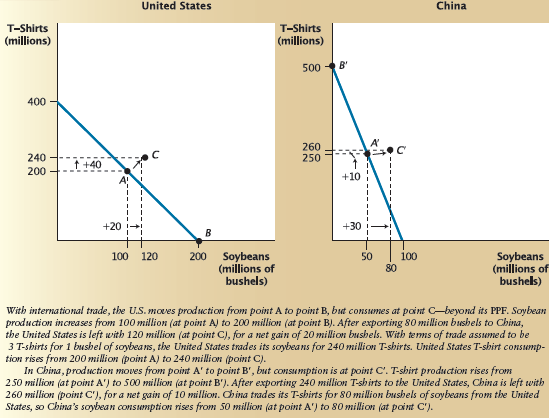
Microeconomics 6th Edition by Robert Hall, Shirley Kuiper, Marc Lieberman
Edition 6ISBN: 978-1133708735
Microeconomics 6th Edition by Robert Hall, Shirley Kuiper, Marc Lieberman
Edition 6ISBN: 978-1133708735 Exercise 5
Redraw the PPFs for the United States and China from Figure 1 in the chapter. Assume that the initial production and consumption points ( A and A ?)and the new production points ( B and B ?)are the same as in that figure. Plot the new consumption points ( C and C ?)that correspond to your results from the problem (1).
Figure 1: The Gains from Specialization and Trade

Problem (1)Refer to Table 1 in the chapter. Suppose the terms of trade are four T-shirts for each bushel of soybeans (instead of three for one as in the chapter). Assume the United States increases soybean production by 100 million bushels and exports 60 million to China. China increases its T-shirt production by 250 million. Some of the remaining numbers in the table will have to change,to be consistent with these new specifications. Then,answer each of the following questions.
a. Does China still gain from trade? Explain briefly.
b. Does the United States still gain from trade? Explain briefly.
c. Compare the effects of trade for China under the new and old terms of trade. In which case does China fare better? Explain briefly.
d. Compare the effects of trade for the United States under the new and old terms of trade. In which case does the United States fare better? Explain briefly
Table 1

Figure 1: The Gains from Specialization and Trade

Problem (1)Refer to Table 1 in the chapter. Suppose the terms of trade are four T-shirts for each bushel of soybeans (instead of three for one as in the chapter). Assume the United States increases soybean production by 100 million bushels and exports 60 million to China. China increases its T-shirt production by 250 million. Some of the remaining numbers in the table will have to change,to be consistent with these new specifications. Then,answer each of the following questions.
a. Does China still gain from trade? Explain briefly.
b. Does the United States still gain from trade? Explain briefly.
c. Compare the effects of trade for China under the new and old terms of trade. In which case does China fare better? Explain briefly.
d. Compare the effects of trade for the United States under the new and old terms of trade. In which case does the United States fare better? Explain briefly
Table 1

Explanation
With the new terms of trade being 4,coun...
Microeconomics 6th Edition by Robert Hall, Shirley Kuiper, Marc Lieberman
Why don’t you like this exercise?
Other Minimum 8 character and maximum 255 character
Character 255


